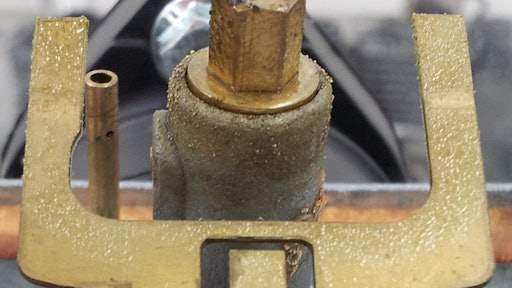
For outdoor power equipment owners, there’s nothing more frustrating than a snowthrower that won’t start during that first snow storm, or the lawnmower that refuses to fire up for the first cut of the season. Oftentimes, issues with hard-starting engines stem from bad fuel.
The solution to many of these maintenance woes is actually quite simple: Use an effective fuel treatment at every fill-up. Fuel treatment should be used both for preventative maintenance, as well as storage.
So what is “bad” fuel?
Stale gasoline that has oxidized. Gasoline can begin to degrade, and fuel oxidization can occur 30 days after gasoline is pumped. Over time, fuel molecules will become less stable and oxidize. As fuel oxidizes it can turn to gum and clog jets and other openings in the fuel system, leading to non-starting or poor running conditions. Gummed-up carburetors cause serious problems in power equipment that sees intermittent use or long periods of storage. (See images 1 and 2.)
Ethanol-blended fuel. About 90% of the fuel sold in the United States contains ethanol, usually designated as E10. Ethanol-blended fuel is a corrosive substance and can cause the gradual destruction of the metal used in the fuel systems of outdoor power equipment.
Corrosion in the fuel system can come from two areas: water and the fuel itself. Ethanol-blended fuel is especially corrosive to soft metals found in fuel systems such as brass and aluminum. Ethanol also absorbs water, drawing it into the fuel mixture. Water is highly corrosive to a fuel system and, when ethanol and water combine, it can cause performance problems and fuel system damage. (See image 3.)
Are fuel-related problems top-of-mind?
As the world’s leading manufacturer of gasoline-powered engines for outdoor power equipment, Briggs & Stratton understands what it takes to maintain good engine health. In order to ensure its engines continue to start easily and last long, Briggs & Stratton constantly focuses on educating dealers and consumers on the importance of outdoor power equipment maintenance, especially in the areas of fuel treatment and ethanol-related problems. What many outdoor power equipment owners don’t know is that, in many cases, engine damage related to bad fuel voids the warranty of the engine.
Fuel-related problems are top-of-mind for Briggs & Stratton, and should be for dealers too. In fact, Briggs & Stratton points out, the issues with “bad” fuel are so important to it as an engine manufacturer that its engineers worked with experts in the lubricant industry to develop Briggs & Stratton Advanced Formula Fuel Treatment & Stabilizer, the only 5-in-1 formula that prevents ethanol problems and stabilizes fuel. (See image 4.)
Lack of recognized industry standards
With so many fuel treatments on the market today, it can be confusing for dealers to know which products they should have on their shelves, making it critical for them to truly understand the products they are selling to their customers.
“The problem with fuel treatment today is the lack of industry standards or regulation,” says Dan Gregg, executive vice president of Lube-Tech. “Anyone can bottle any type of chemicals, claim that it treats fuel and sell it to consumers.”
The experts at Lube-Tech have provided some insights into the properties of an effective fuel treatment, along with some of the chemistry that goes into formulating fuel treatment. Additionally, experts at Briggs & Stratton have explained how their fuel treatment addresses the problems with ethanol-blended fuels, highlighted by Lube-Tech’s chemists.
Properties of an effective fuel treatment
An effective fuel treatment will combat the two main causes of engine damage that occur when using today’s fuel: oxidation and corrosion. A basic fuel treatment will address both of these problems with effective antioxidants and corrosion inhibitors.
Antioxidant. Antioxidants help promote stability, preventing the “clumping” that causes gummed fuel and can result in clogged jets. Briggs & Stratton Advanced Formula Fuel Treatment is formulated with the most powerful blend of triple antioxidants and provides up to three years of fuel stability.
Corrosion Inhibitor. Equipment owners also want to look for fuel treatments that feature a corrosion inhibitor to block corrosion that can occur when moisture comes into contact with the metal parts in an engine. Briggs & Stratton Advanced Formula Fuel Treatment contains high-performance corrosion inhibitors to protect the soft metals commonly found in most fuel systems.
Aside from those two critically important properties, there are other things to also consider.
Detergent. One additional component of an effective fuel treatment is a fuel system cleaner, or detergent, to help clean fuel lines, carburetor jets, needles, and even intake valves. Briggs & Stratton Advanced Formula Fuel Treatment contains advanced detergents to maintain fuel system health.
Alcohol. One thing equipment owners don't want in the fuel treatment they use is added alcohol. With many ethanol-blended fuels containing up to 10% ethanol, the last thing an equipment owner would want is to add more alcohol to the fuel. Also, owners need to be particularly cautious when reading fuel treatment labels. Alcohol, or oxygen-containing solvents, can be listed under many names, including ethanol, glycol ether or isopropyl alcohol. Briggs & Stratton Advanced Formula Fuel Treatment contains no alcohol.
Always make fuel treatment part of the customer conversation
Undoubtedly, one of your keys to success is ensuring that your customers are satisfied when they leave your shop. If a customer comes to you with an engine that needs repair due to “bad” gas, the best way to keep that customer for life is to make sure they don’t experience the same problem again in the near future.
Fuel treatment should always be part of the customer conversation, whether the sale has been finalized, the customer is getting equipment serviced, or the customer is just window shopping.
Educate customers on preventative care, rather than trying to fix the problem after it has happened. It’s cheaper to maintain good engine health than to repair a damaged engine later.
Let the customer know that all gas is not created equal. The fuel they pump for their automobile is not formulated for their outdoor power equipment, and should be treated with an effective fuel treatment every time they fill their fuel can.
No one likes to be caught off-guard. Make sure all employees at your store/shop are educated on the damaging effects of ethanol and the essentials of an effective fuel treatment so they can answer any questions your customers may have. Turn to engine manufacturers that produce fuel treatment for their particular equipment, as it is in their best interest to keep their products running at optimum levels. These manufacturers are also good sources for content and images to help you make the sale.
There’s no better selling tool than letting the customer see firsthand the benefits of a product (see image 5). If you just finished up a costly repair for the customer, hand them a sample pouch of fuel treatment and give them a short overview of its benefits. Remind them of the importance of using it as preventative maintenance as well as for storage. After experiencing the easy starting associated with an effective fuel treatment, they’ll likely be back to purchase more.
Educating your customers on the benefits of fuel treatment and the damage it can prevent positions you, the dealer, as a trustworthy and credible source. It shows you’re looking out for the customer with preventative care tips rather than trying to capitalize when the equipment malfunctions. And building those long-lasting relationships with your customers is paramount to your success.





























